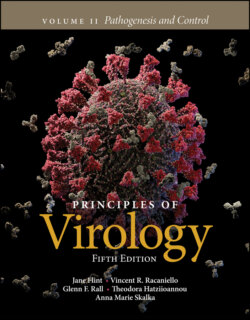Читать книгу Principles of Virology, Volume 2 - Jane Flint, S. Jane Flint - Страница 2
Table of Contents
Оглавление1 Cover
2 Preface
3 Acknowledgments
4 About the Authors
5 Key of Repetitive Elements
6 1 Infections of Populations: History and Epidemiology Introduction to Viral Pathogenesis A Brief History of Viral Pathogenesis Viral Epidemics in History Epidemiology Parameters That Govern the Ability of a Virus to Infect a Population Perspectives References
7 2 Barriers to Infection Introduction An Overview of Infection and Immunity Successful Infections Must Modulate or Bypass Host Defenses Viral Tropism Spread throughout the Host Organ Invasion Shedding of Virus Particles Perspectives References
8 3 The Early Host Response: Cell Autonomous and Innate Immunity Introduction The First Critical Moments: How Do Individual Cells Detect a Virus Infection? Cell-Intrinsic Defenses Secreted Mediators of the Innate Immune Response The Innate Immune Response Perspectives References
9 4 Adaptive Immunity and Establishment of Memory Introduction Attributes of the Host Response Lymphocyte Development, Diversity, and Activation Events at the Site of Infection Set the Stage for the Adaptive Response Antigen Processing and Presentation The CTL (Cell-Mediated) Response The Humoral (Antibody) Response Immunological Memory Perspectives References
10 5 Patterns and Pathogenesis Introduction Animal Models of Human Diseases Patterns of Infection Viral Virulence Pathogenesis Perspectives References
11 6 Cellular Transformation and Oncogenesis Introduction Oncogenic Viruses Activation of Cellular Signal Transduction Pathways by Viral Transforming Proteins Disruption of Cell Cycle Control Pathways by Viral Transforming Proteins Transformed Cells Increase in Size and Survive Tumorigenesis Requires Additional Changes in the Properties of Transformed Cells Other Mechanisms of Transformation and Oncogenesis by Human Tumor Viruses Perspectives References
12 7 Vaccines Introduction The Origins of Vaccination Vaccine Basics The Science and Art of Making Vaccines Vaccine Technology: Delivery and Improving Antigenicity The Ongoing Quest for an AIDS Vaccine Perspectives References
13 8 Antiviral Drugs Introduction Discovering Antiviral Compounds Drug Resistance Examples of Antiviral Drugs Expanding Targets for Antiviral Drug Development Two Stories of Antiviral Success Perspectives References
14 9 Therapeutic Viruses Introduction Phage Therapy Oncolytic Animal Viruses Gene Therapy Vaccine Vectors Perspectives References
15 10 Virus Evolution Virus Evolution How Do Virus Populations Evolve? The Origin of Viruses Host-Virus Relationships Drive Evolution Lessons from Paleovirology Perspectives References
16 11 Emergence The Spectrum of Host-Virus Interactions Encountering New Hosts: Humans Constantly Provide New Venues for Infection Common Sources for Animal-to-Human Transmission Viral Diseases That Illustrate the Drivers of Emergence The Contribution to Emergence of Mutation, Recombination, or Reassortment New Technologies Uncover Previously Unrecognized Viruses Perceptions and Possibilities Perspectives References
17 12 Human Immunodeficiency Virus Type I Pathogenesis Introduction HIV-1 Is a Lentivirus Entry and Transmission The Course of Infection Virus Reproduction Immune Responses to HIV-1 HIV-1 and Cancer Prospects for Treatment and Prevention Perspectives References
18 13 Unusual Infectious Agents Introduction Viroids Satellite Viruses and RNAs Prions and Transmissible Spongiform Encephalopathies Perspectives References
19 APPENDIX: Epidemiology and Pathogenesis of Selected Human Viruses Adenoviruses Arenaviruses Bunyaviruses Caliciviruses Coronaviruses Filoviruses Flaviviruses Flaviviruses Flaviviruses Hepadnaviruses Herpesviruses Herpesviruses Herpesviruses Orthomyxoviruses Papillomaviruses Paramyxoviruses Paramyxoviruses Picornaviruses Picornaviruses Picornaviruses Polyomaviruses Poxviruses Reoviruses Reoviruses Retroviruses Retroviruses Rhabdoviruses Togaviruses Togaviruses
20 Glossary
21 Index
22 End User License Agreement
